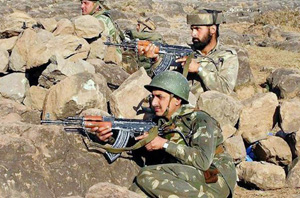Jammu, Jan 1: India will launch a strong protest with Pakistan over fresh ceasefire violations at the International Border here that has left a BSF jawan dead and another injured.
"They (Pakistan) have violated the norms on international border. We are going to lodge strong protest to them (over ceasefire violation)," Inspector General of Border Security Force (BSF) Rakesh Sharma told reporters here.
Home Minister Rajanth Singh said Pakistan should desist from such violations and officials of both the countries have been in touch over the issue.
"Pakistan should not do this. Diplomats of both the countries remain in constant touch," Singh said, adding normalcy will return soon.
Sharma said that about 50-60 terrorists are waiting to sneak into the Indian side in Jammu and Kashmir from Pakistan.
"There are about 50-60 terrorists at the launch pads on the other side waiting at the international border," he said adding that security measures have been intensified on the Indian side to check any untoward incident.
Pakistani Rangers violated ceasefire again today by firing on 13 border outposts in Samba sector, drawing retaliation from BSF.
The violation comes after four Pakistani Rangers were yesterday killed in BSF's strong retaliation after a jawan of the force lost his life in heavy firing from the other side on a patrol along the International Border in Samba district.
"Pakistani rangers resorted to firing on 12 to 13 BoPs along the IB in Samba sector overnight," Sharma said.
"The BSF also retaliated, resulting in exchanges which continued till 0600 hours today," the IG said.
"There was no causality or injury to anyone in the firing today," he said.
Today's firing by Pakistan was the third ceasefire violation along the IB in the past three days and seventh in last eight days.
In yesterday's incident, one BSF jawan was killed and another injured in firing by Pakistan on Regal post in Samba.
BSF had retaliated effectively to the Pakistani firing and four Pakistani rangers were killed (opposite to Regal post) along the IB in the Samba sector, Sharma had said.
As Pakistani Rangers suffered casualties, they had waved white flags asking BSF to stop the firing so that they can lift the bodies of their dead men, he had said.
Honouring their request, BSF had stopped the firing and allowed them to come to the border line and lift the bodies.
Pakistan had yesterday summoned Indian Deputy High Commissioner in Islamabad alleging that India had violated the ceasefire.





Comments
Add new comment